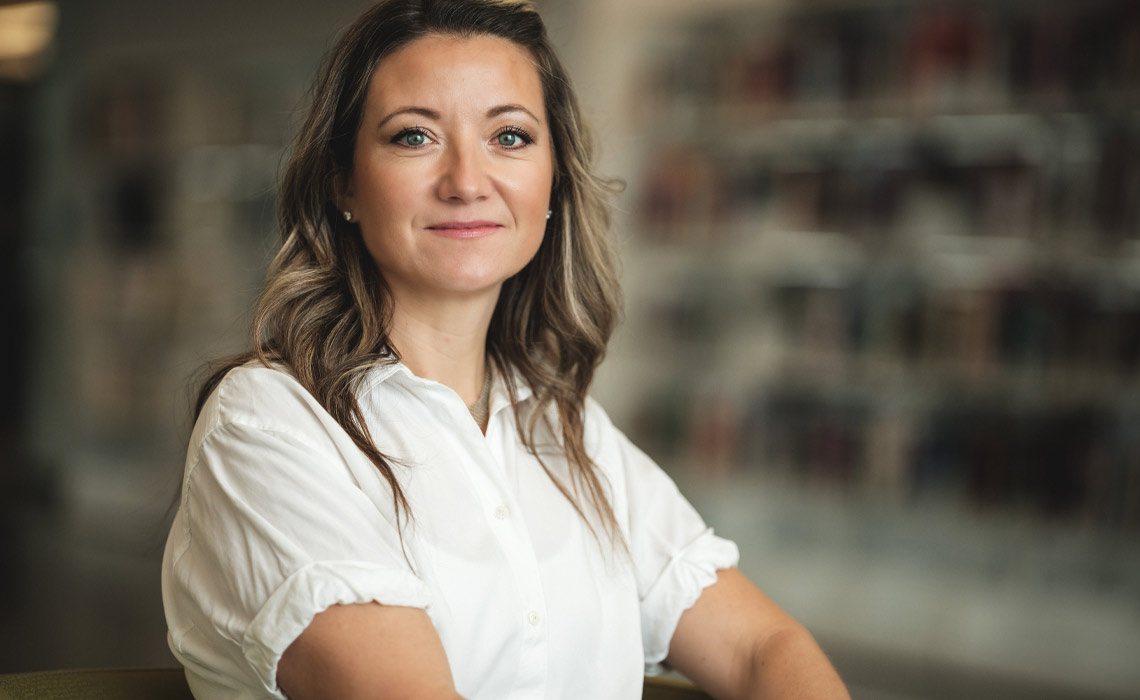We are all future older people

The World Health Organization suggests that, “ageism may now be even more pervasive than sexism and racism.” Youth and beauty are coveted to extremes, with prepubescent girls using anti-aging skin creams and care products, and people in their 20s getting Botox injections. Negative stereotypes around aging are not going anywhere, and their effects are most clearly seen within health-care systems.
Unfortunately, the pandemic provided the perfect circumstances to reveal ubiquitous ageism in society, and with serious consequences.
According to Aging & Thriving In the 21st Century, a report produced by MRU’s Institute for Community Prosperity in co-operation with the ATCO Group, through the first two waves of the pandemic more than 80 per cent of all COVID deaths in Canada were of those living in long-term care facilities (LTCs), the highest rate of any Organisation for Economic Co-operation and Development member country. About 63 per cent of LTCs nationwide had experienced outbreaks by September 2021, and more than 15,000 residents had died.
The offensive hashtag #BoomerRemover became sadly popular at the time.
Canada’s population is aging rapidly, and with that comes a need to rethink how we treat our older people and study our internal biases. Environics Analytics estimates that as of 2023 there were about 7.6 million people aged 65 and older in Canada. By 2043, about one in four Canadians will be 65 years old or above, which equals more than 11 million people. Currently there is a shortage of health-care workers focusing on aging health, even though as of July 1, 2024, there were 965 centenarians (a person 100 years old or older) living in Alberta, according to the Alberta Treasury Board and Finance.
Mount Royal University’s Chair in Older Adult Health (a position funded by the Riddell Family Charitable Foundation) Jocelyn Rempel is keenly aware of this growing segment of the population. Rempel is a registered nurse, consultant and MRU faculty member, and says, “As people age, they undergo numerous transitions and face various losses, particularly in physical and mental health. Social changes often lead to isolation and loneliness and navigating these changes can be challenging for an older person, especially in a system that is quite siloed in nature.”
Over the course of the past 100 years, improvements in health care have added 20 years to the life expectancy of Canadians. The system is excellent at increasing lifespans, but society is at a loss as to how to properly treat older people, who still have a lot to offer.
Ageism can influence treatment decisions, with older adults sometimes receiving less aggressive or inferior treatment options compared to younger patients, contributing to a lower quality of life. Older adults may also feel dismissed or belittled, leading to avoidance of health-care settings altogether, which can result in worsening conditions.
“Managing multiple chronic conditions is complex and resource-intensive, requiring co-ordinated care to avoid treatment duplication,” Rempel says. “Our negative societal view towards aging doesn’t attract many specialists into this area of work. This shortage impacts the quality and accessibility of care. Despite older adults being the highest users of the health-care system, geriatric care remains chronically underfunded.”
When do we get 'old'?
“Old age” itself is difficult to define, and made even trickier by the fact that internalized ageism (discriminating against ourselves as we age) starts young, says Joan Gregory, an MRU alumna who returned to school in her mid-50s. It was health that led her back towards education, as she found herself taking on the role of her father’s primary caregiver for 14 years after her mother passed away.
While her father was going through his aging experience, Gregory volunteered as a palliative caregiver in a hospital setting for 10 years.
“I was his advocate. And there were things going on that I was concerned about, and I just felt like more knowledge would be more empowering,” Gregory says. She found the post-graduate Studies in Aging Certificate, which was offered as an advanced specialty health-studies program at Mount Royal.
“When I went back to school, I had contemporaries who said, ‘Oh, I couldn’t do that,’” she says. “We’ve all internalized what we’ve learned socially towards age, so the longer you live, the more indoctrinated you become. By the time you are older and old age is more relevant to you, you’re a victim of your own negative beliefs. It’s very self-limiting.”

Aging and health are not always directly correlated, but are definitely assumed to be. For example, there are 95-year-olds who can run marathons, so their functional and biological age are much different than a 55-year-old who has experienced several chronic health conditions or obstacles in their life.
Interestingly, researchers at the University of Oxford and University College London found that people born since 1945 (the baby boomers) have worse health than previous generations at the same age, and are more likely to have doctor-diagnosed diabetes, high cholesterol, heart problems and a variety of other chronic health conditions.
This diversity is extremely important to understand, especially in health care, Rempel explains.
As the population ages, those differences will become a dominant driver of health delivery.
According to provincial government figures, by 2046 one in five Albertans will be 65 years of age or older, making up more than 1.2 million of the total population.
The demand for continuing care will increase even faster due to people living longer and with more complex needs. This will result in a projected 80 per cent increase in demand for continuing care over the next 10 years. This demographic reality resulted in a five-year, $627-million bilateral funding agreement between Alberta and the federal government to support care initiatives, which began last year.
“Caring for aging people requires time and relational care, which they often do not receive during brief interactions within the health system,” Rempel emphasizes.
Centre for Health and Innovation in Aging
MRU has established the Centre for Health and Innovation in Aging to be part of the solution. The Centre addresses a variety of challenges and opportunities around aging health and brings together interested partners.
“It serves as a pivotal hub bridging the gap between health and innovation while championing the representation of older adults in this dynamic field. By offering an interdisciplinary platform focused on aging health and innovation, we hope the Centre will become a catalyst for holistic understanding and transformative solutions,” says Rempel, who also acts as the Centre’s director.
The Centre for Health and Innovation in Aging provides students with invaluable exposure to diverse career paths within this expanding field. This initiative aligns with the evolving health-care landscape and nurtures a generation of professionals equipped to address the challenges and opportunities associated with aging, fostering innovation and promoting comprehensive well-being for older individuals.
The possibilities presented are “exciting,” says Dr. Stephen Price, PhD, dean of the Faculty of Health, Community and Education. “This cross-disciplinary approach involving community and industry partners sets the Centre apart and is aligned with current needs in health care and MRU’s strategic goals.”
The Centre also places a significant emphasis on fostering relationships with community and industry partners due to the intrinsic value they bring to the initiative.
One of the ways it is doing that is through its Intergenerational Speaker Series, which brings students and older people together on campus. Gregory is in her third year of volunteering on the planning committee for the series and is also a research assistant for the Centre. Having older people on campus promotes insightful conversations between generations, and the events have often been over capacity in attendance. Gregory didn’t stop after her certificate, going on to earn her Social Work Diploma and a Bachelor of Arts — Sociology with a minor in psychology at MRU. Living the very definition of the sandwich generation, Gregory cared for her father while also looking after her son as a single parent. Her situation caused her to reflect, and to search out further understanding.
“It’s in everybody’s best interest to learn as much as you can about the kinds of language you’re using about older people, how you think about them yourselves, how you’re perpetuating ageist attitudes and behaviours in society, and in your lives,” she says.
Gregory points to the greeting card industry and birthday cards that depict older adults as unattractive, incompetent and forgetful. While at one point they may have seemed cutesy and colloquial, “I can’t even buy one of those anymore. I do not find that funny,” she says, and references a book by Dr. Becca Levy, PhD, of Yale’s School of Public Health. In Breaking the Age Code, Levy points to one of the most harmful effects of internalized ageism: “People who internalize it live on average seven-and-a-half years less than people that don’t.”
In short, ageism shortens lives.
60 is the new 60'
There is embedded shame and fear in getting older, Gregory says. The saying, “60 is the new 40” isn’t hopeful. It’s actually ageist.
“It’s like, ‘No, 60 is the new 60.’ There’s that unacceptance of being your age. No, I’m not the ‘new 40.’ ”
As people age, they get sandwiched between the needs of their children and those of family members in need of assistance the health-care system is not able to properly provide. Then there is the grief and loss that inevitably comes with getting older, whether it’s the deaths of loved ones, the loss of a career, the loss of status, the loss of identity, the loss of financial security . . .
“The sky’s the limit when it comes to working with people to navigate those transitions that they’re making,” Gregory says.
The best thing, the primary thing, is to always understand that, “You are that future old person. You have to be reflective on what it might mean to be older. It’s inevitable. Question your own unjust beliefs, because we all have them.”
And then we move forward into a different future. Not the one illustrated on greeting cards.

